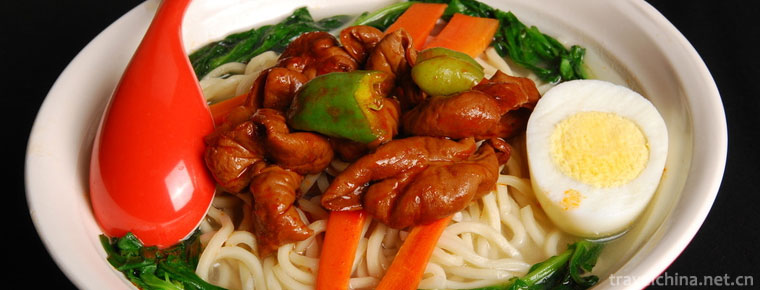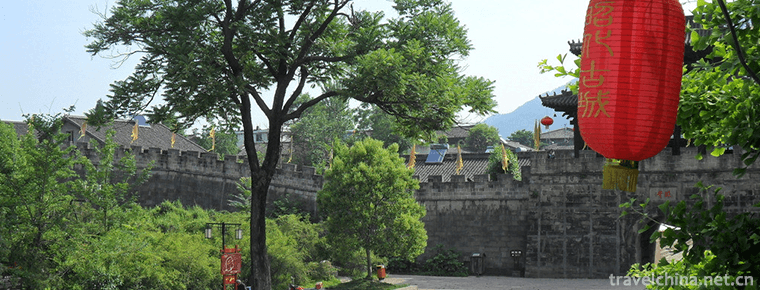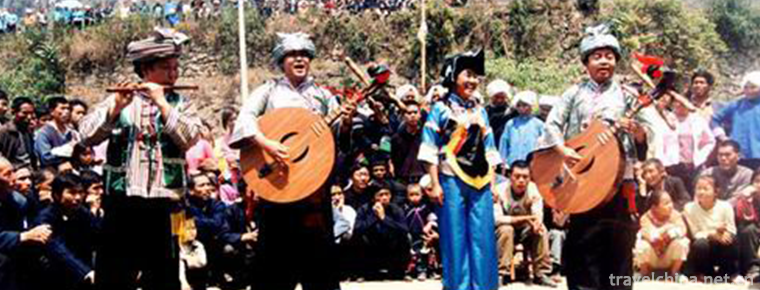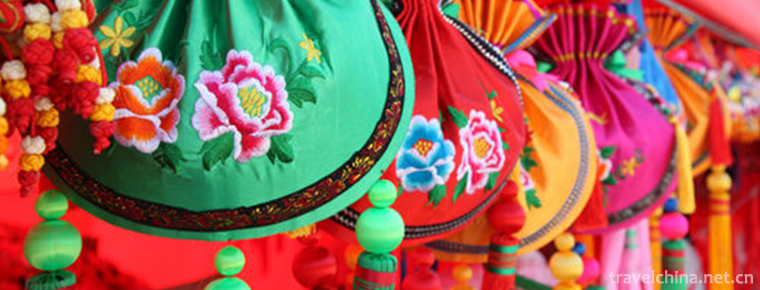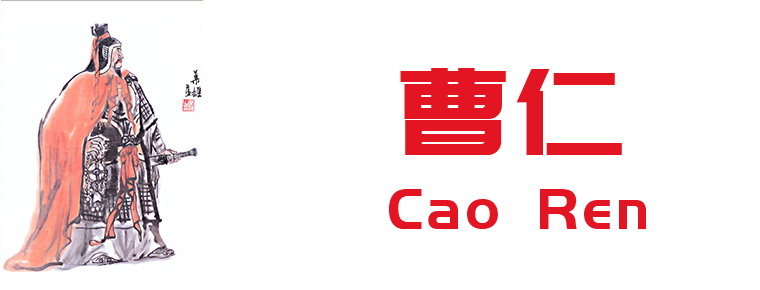Lanzhou handpulled noodlesLanzhou Beef Noodles
Lanzhou beef noodles, also known as Lanzhou clear soup beef noodles, is one of the "top ten noodles in China", and is a delicious snack in Lanzhou area of Gansu Province. With its unique flavor of "clear soup mirror, fragrant meat, fine noodles" and "clear two white, three red, four green and five yellow", Yiqing (clear soup), two white (white radish), three red (hot pepper oil red), four green (coriander, garlic seedling green), five yellow (noodles yellow and bright), it has won praise from customers both at home and around the world. By the Chinese Cuisine Association, it is rated as one of the three major Chinese fast food products.
It is said that Lanzhou beef noodles originated in the Tang Dynasty. At present, there are historical records that the Lanzhou beef noodle began in the Qing Dynasty Jiaqing year, the founder: Chen Wei Jing. After inheritance and improvement, Lanzhou beef noodle standard was unified by "Yiqing (soup), Erbai (radish), Sanhong (spicy), Four Green (coriander and garlic seedlings) and Wuhuang (noodle yellow and bright). The five steps of its production, including material selection, noodles blending, steamed noodles, slippers and noodles, skillfully utilize the physical properties of the ingredients, namely, the extensibility and elasticity of gluten protein.
Lanzhou beef noodle is the most popular popular snack in Lanzhou.
Lanzhou noodle soup with beef noodle served as a flavor food for senior guests in Northwest China. Because of its delicious taste and economic benefits, Lanzhou beef noodle restaurants are not only ubiquitous in Lanzhou, but also in various provinces and even in many countries and regions of the world. Local people in Lanzhou usually call Lanzhou beef noodles "beef noodle". Young people also call it "big ox" or "big bowl of beef".
Lanzhou Ramen has a history of 200 years. Its founder, Chen Weijing, was a student of the Imperial Supervisor of the State during the Jiaqing period of the Qing Dynasty. In Lanzhou beef noodles improvement and unified standards (one Qing, two white, three red, four green, five yellow), Chen Weilin, Chen Xiesheng and Chen Hesheng brothers played a key role in turning this street snack into a popular delicacy. Hot pot noodles were created by Ma Baozi in 1915, when Ma Baozi's family was poor and forced by life. He made hot pot beef noodles at home and peddled along the streets of the city shoulder to shoulder. Later, he added boiled cattle and sheep's liver soup to beef noodles, which smelled good and everyone liked his beef noodles. Then he opened his own shop, instead of Hawking along the street, he thought about introducing a free "bowl of soup into the shop". When the guests came in, the guys immediately served a bowl of hot beef soup to invite the guests to drink, refreshing and refreshing. Ma Baozi's beef noodles with clear soup were well-known. Ma Baozi's son Ma Jiesan took over the management until 1925. Ma Jiesan continued to work hard on improving beef noodles with clear characters. Later, Ma Baozi's parties were given the reputation of "Wenxiang Xiama, Zhiwei Parking". To identify the authenticity of Lanzhou ramen, we need to see whether there is a free bowl of soup in the shop, authentic soup must be given. The soup of cattle and sheep's liver is a clear purpose. Many people in Western Regions have eyes like torches, obviously related to drinking this soup. Second, to see whether the soup of beef Ramen is clear or not, the soup is not authentic. Perhaps the soup link has long been omitted.
1919 after he opened his own shop, he didn't have to peddle in the street. Ma Baozi's beef noodle shop with clear soup is also well-known and widely spread among Dongxiang, Salar and Baoan nationalities in Northwest China. Lanzhou beef noodle noodle is famous for its bowl of noodles. It is famous for its fresh broth and delicate noodles. It embodies the wisdom and efforts of Chen Ma and countless chefs who specialize in beef noodles with clear soup.
In 1925, his son Majie took over the operation. Majie continued to work hard on the word "Qing" and constantly improve the beef ramen. Later, he was given the reputation of "Wenxiang dismounted, Zhiwei parking". Zhang Shuceng, the Qing Dynasty poet, praised the "Lanzhou beef noodle" by Ma Jia's uncle.
The rain passes through the golden city gate, and the white horse shes back. A few degrees of the Yellow River water, the road is poor.
Pull noodles, thousands of incense, but only one horse. It's hard to return to your hometown.
The sun rises and reads the truth. Burning incense, sighing, looking forward to beef noodles.
At least in the Qing Dynasty Jiaqing year "Lanzhou broth beef noodles" is already a delicious snack in Lanzhou.
Legend has it that in the 1940s, a bearded official often visited the Hot Pot Noodle Restaurant at Jiuquan Road, Lanzhou. Once he had a meal, he asked the shop name, and the boss was exactly the same. He said, this hot pot is not good to listen to. Look at the soup, the meat is rotten, and the taste is delicious. It's better to call it "beef noodles with clear soup". This bearded official is Mr. Yu Youren. He later returned to Chongqing, and after he praised Lanzhou beef noodle, he became famous all over the country. From this point of view, Mr. Yu Youren is the earliest spokesman for Lanzhou beef noodle.
Yu Youren left a revolutionary footprint in Longshang, but also left a lot of ink. If the name of beef noodles in clear soup comes from old age, it is also very fortunate. Folklore always likes to associate important things with famous people. Although the authenticity is doubtful, it is people's thinking inertia.
Historical controversy
Deng Ming, a local history scientist in Lanzhou, believes that the history of beef noodles in Lanzhou is quite clear. In the 1990s, with the gradual popularization of the Internet, the ridicule of netizens, and commercial purposes, the history of Lanzhou beef noodles was artificially confused.
In the following 200 years, Lanzhou beef noodles are famous for their fresh broth and delicate noodles. In 1999, Lanzhou beef noodles were designated as one of the three pilot varieties of Chinese fast food, which is known as "the first side of China".
Lanzhou beef noodles brand is numerous, competition incentives, public funds to eat and drink drastically reduced, resulting in the depression of high-end hotel industry, many large hotels in Lanzhou have transformed beef noodles, which makes the beef noodles industry facing a test, many beef noodles have to work hard on the taste, in order to maintain market share.
Lanzhou beef noodles, as an indispensable part of Lanzhou people's life, can not be simply defined as "snacks". For some people, beef noodle is the daily necessity and the beginning of a day. According to an official statistics, more than 900 noodle restaurants in Lanzhou City sell more than 800 bowls of noodles a day on average, of which breakfast accounts for more than half. According to this figure, more than 2.5 million residents and floating population in Lanzhou urban area, 1 out of every 4 people eat a bowl of noodles every day. Most noodles open at 6:30 a.m. to 10:00 a.m. is the peak of daily attendance. A small noodle restaurant may receive hundreds of people every day. During this period of time, beef noodle restaurants are full of people. In order to communicate between noodles, seats and ticket sellers, they must shout loudly. This also constitutes a major feature of beef noodle restaurants. Traditional noodle restaurants don't have waiters. Everyone rushes for the same purpose. Just pay for noodles directly. Customers and shop assistants have a good cooperation.
Compared with Guangzhou or Shanghai's early tea, beef noodle restaurant has the following characteristics:
1. Fast food, high efficiency: the time to make a bowl of noodles from pulling to loading is about 1 minute; a skilled noodlemaker can pull 8-10 copies of noodles per minute. General customers can complete the whole meal process in 7-15 minutes. The production of Lanzhou beef noodles is completely pipelined to ensure speed.
2. Measurability: Although Ramen is hand-made, long-term experience and industry tacit understanding ensure the measurement standard of each bowl of noodles, the net weight of noodles is about 250 grams. The bowl is kept uniform, which determines that the capacity of the soup can be measured. Although the randomness of meat and other accessories is large, there is not much difference in basic requirements.
3. Predictability: the taste and quantity of noodles, the quality and taste of soup, and the basic criteria of "one, two, three, four and five" will generally remain unchanged. Although different stores differ slightly in taste, they will not be too outrageous.
4. Controllability: ordering long queues, limited menus, few poor choices, uncomfortable seats will allow customers to follow the operator's intentions - eat quickly and leave quickly.
5. New development: In order to enrich the selectivity of beef noodles, some restaurants have added meatballs, one yuan per restaurant. It can be used as a substitute for beef.
Entering the mountains is not a five spring. The mountain is silent and the sound is urgent.









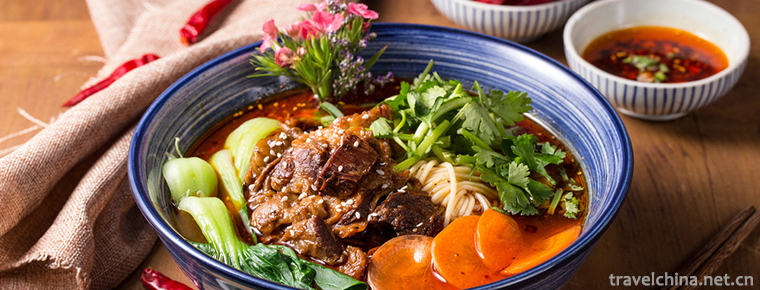
-
Pork intestine Noodles
Pork intestine Noodles are famous traditional snacks in Sichuan.
Views: 197 Time 2018-10-12 -
Guilin Yaoshan Scenic Area
Yaoshan is located in the eastern suburb of Guilin City, 8 kilometers away from the city center. The main peak is 909.3 meters above sea level and 760 meters above sea level. It is the highest peak in.
Views: 150 Time 2019-01-13 -
Dragon Tower
Longta refers to Heilongjiang radio and television tower. It is the landmark building of Harbin. The tower is 336 meters high and is a famous high-steel tower in Asia. On November 8, 2008, the Steel T.
Views: 401 Time 2019-02-06 -
Luliang Colorful Sand Forest
Luliang color sand forest is a national AAAA tourist area, 18 kilometers away from Luliang County. 108 named scenic spots are located in the "Y" shaped canyon, with a total area of 180 hecta.
Views: 132 Time 2019-02-06 -
Zhaohua Ancient City Scenic Area
The ancient city of Zhaohua has a long history and rich humanities in Zhaohua Town, Zhaohua District, Guangyuan City, Sichuan Province. The original name of Yichang County was changed to Zhaohua Count.
Views: 164 Time 2019-03-17 -
Buyi Folk Songs
Bouyei folk songs have special features, such as ancient songs, narrative songs, love songs, wine songs and labor songs; solo, duet, chorus and duet in form; tunes are divided into major and minor. Ev.
Views: 143 Time 2019-04-04 -
Black Tea Production Techniques
Black tea, originally known as "Border Tea", was smuggled across the border by merchants as early as the end of the 16th century. In the Ming Dynasty, black tea was designated as.
Views: 112 Time 2019-05-03 -
monologue storytelling accompanied by drumbeats
Plum blossom drum, born in the middle of the Qing Dynasty, originated in Beijing, is popular in Beijing and Tianjin. Before liberation, the sons and daughters of Beijing Banner People liked to sing me.
Views: 256 Time 2019-06-03 -
Qingyang Xiangbao embroidery
According to the pattern of paper-cut, various patterns are embroidered on the silk fabric with colorful thread, then different shapes are sewn, and the inner core is filled with silk, cotton and spic.
Views: 117 Time 2019-06-11 -
Cao Ren
Cao Ren (168 - 23 May 6th), Zi filial piety, Han nationality. Pei country Qiao (today) Anhui Cao Cao, Bozhou From younger brother (from ancestor). The famous heroes of the Three Kingdoms period..
Views: 149 Time 2019-09-15 -
Yibin Jiuzhou tower
Jiuzhou tower was built in the third year of Daguan in Northern Song Dynasty, that is, in 1109 ad, located in Yibin, Sichuan Province. The foot of the tower is 7.35 meters long from north to south.
Views: 318 Time 2020-10-16 -
Guangan Airlines
There is no airport in Guang'an, but there are many airports around it. At the same time, Guang'an terminal building of Chongqing Jiangbei International Airport has been built in the urban area. Guang'an is 110 kilometers away from Chongqing Jian.
Views: 170 Time 2020-12-19
